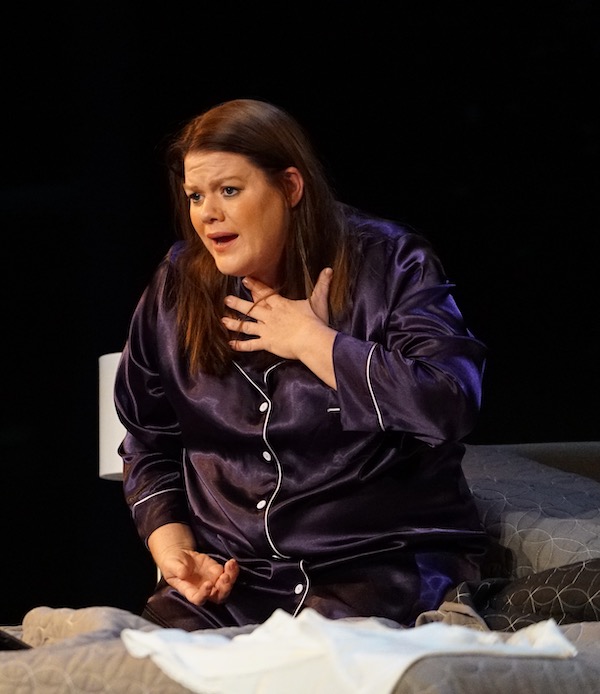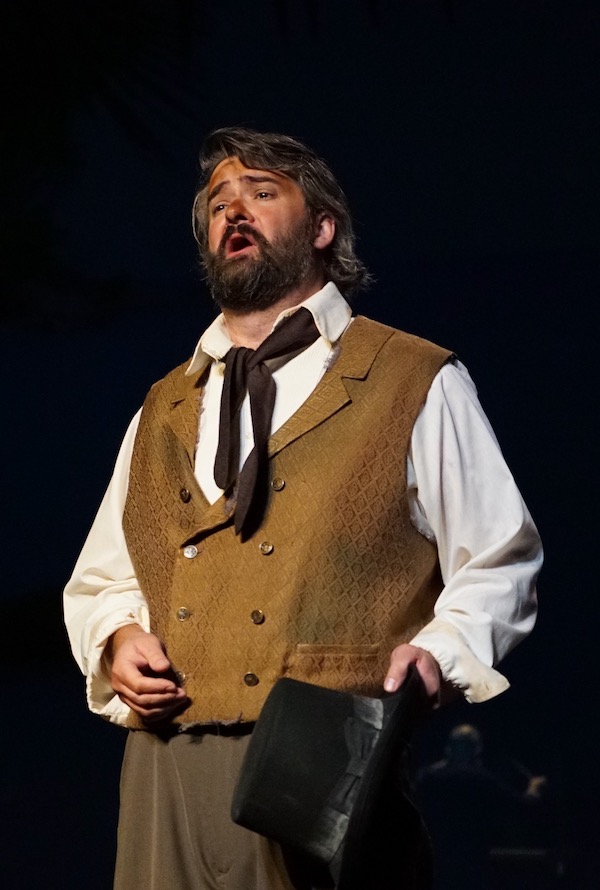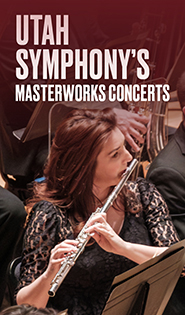Harmer dazzles in Utah Opera’s downsized season opener

Even a pandemic has some silver linings.
Due to the ongoing public health crisis, Utah Opera audiences won’t hear soprano Wendy Bryn Harmer make her company debut \as Senta in Wagner’s The Flying Dutchman this month. Instead, operagoers have the dramatically different, yet arguably more thrilling, opportunity to hear Harmer’s spectacular gifts showcased in Poulenc’s La voix humaine.
The monodrama, which shares the bill with Joseph Horovitz’s delightfully daffy two-hander Gentleman’s Island, opened Friday night amid the pandemic precautions to which Utah Symphony patrons have grown accustomed. (Artistic director Christopher McBeth reported that, despite Utah’s ongoing spike in coronavirus cases, he is not aware of any outbreaks associated with concerts in the three weeks since the orchestra started its season.)
Reduced audience capacity made the already intimate La voix humaine, performed in English translation as The Human Voice, feel even more so—almost like a private performance. Harmer was alone on a simple bedroom set, separated from conductor James Lowe and pianist Jason Hardink by a scrim that doubled as scenery. She portrayed a woman’s emotional spiral during a fraught telephone conversation with her unseen and unheard former lover.
Harmer is best-known as a singer of Wagner and other high-voltage dramatic repertoire, and La voix humaine allowed her to unleash that powerhouse voice eventually. (A wave of exhilaration swept through the theater when she finally cut loose on the phrase “I was going crazy!”) But at the beginning of the drama, the power was held in reserve as warmth, lyricism and vocal subtlety prevailed. Because it depicts one side of a phone conversation, most of the writing is in recitative, which Harmer imbued with all the expressiveness of a lush aria. Fresh and youthful-sounding at first, her voice gradually took on a steelier edge as her character grew more desperate.
Hardink, Harmer’s other unseen partner, gave an elegant performance of Poulenc’s piano reduction of his orchestral score. Hardink, pianist of the Utah Symphony, is a versatile musician, equally adept in impressionistic, Romantic and jazz-flavored music, and La voix humaine contains elements of all three. Sometimes the score functions as accompaniment to the soprano; sometimes it hints at the other side of the conversation. At all times, Hardink’s playing was clear and evocative as it ranged from turbulent to melancholy.
Director Kristine McIntyre’s English translation of Jean Cocteau’s libretto includes contemporary tweaks: Instead of an old-fashioned telephone on a party line, the protagonist uses a cellphone and tablet; as she reminisces about happier times with her ex, the vacation photos she’s about to delete pop up on the scrim behind her. Kathy Maxwell’s lighting and projection design is clever and efficient.

After a brief pause to allow for recirculation of the air, the second half of the double-bill brought a pandemic-appropriate version of the Utah Symphony (sans wind instruments, in Lowe’s adaptation of Horovitz’s score) for Gentleman’s Island. The comedic one-act is as different as can be from La voix humaine, though the parallel themes of isolation and communication are inescapable.
Tenor Brian Stucki and baritone Christopher Clayton play proper Englishmen stranded on an island. It would be in the characters’ best interest to team up, but Victorian etiquette is a formidable obstacle to cooperation. Both singers appeared to delight in the droll comedy of manners around which the plot revolves. Though neither singer gets a soaring aria, and Stucki seldom got to display his pinging high notes, both projected strongly and made the most of their sketchy characterizations—Clayton a little more gruff, Stucki a bit more plaintive.
McBeth and the singers have likened the orchestral score to Britten’s lighter operas, and the comparison is apt. There’s a lot of wit on the surface, punctuated by moments of pomposity. Lowe and the orchestra performed it with lightness and charm. Maxwell’s projections have a Monty Python energy, highlighted by a silly dream ballet involving an oyster and a turtle.
Horovitz’s lightish score does not offer the singers as much expressive range as Poulenc does in La voix humaine, and Gordon Snell’s libretto (inspired by William Gilbert’s poem) doesn’t plumb any comparable psychological depths as Cocteau’s. Yet Gentleman’s Island does what it needs to do—serving as a light-hearted foil to the evening’s drama—in jolly fashion.
Utah Opera’s double bill of La voix humaine and Gentleman’s Island continues through October 18. Edith Grossman, Daniel O’Hearn and Brandon Bell will sing the matinee performances. utahopera.org; 801-533-6683.



Posted Oct 14, 2020 at 12:08 pm by Joree Beauchamp Felker
I thoroughly enjoyed both performances! It was so fantastic to see live actors and hear live music! Thank you for putting on this show. I thought it was wonderfully entertaining!